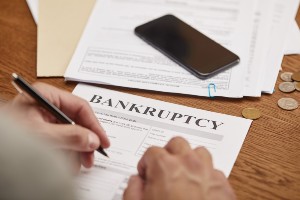It might sound crazy, but it is possible for a person to die once he or she begins filing for bankruptcy. Obviously, as the deceased, you have little concern for the outcome, but your loved ones and others involved in the management of your estate will be forced to deal with the consequences once you are gone. What happens if a debtor dies during the bankruptcy process?
In general, when a person dies, his or her heirs do not become responsible for paying the deceased’s debts, unless those debts were shared. However, the debts are paid out of the deceased’s estates. An in-the-process bankruptcy is handled out of the estate and is not automatically dismissed when the debtor dies. How the estate and bankruptcy are handled is determined by whether a Chapter 7 or Chapter 13 bankruptcy was filed.
Chapter 7 Bankruptcy
Chapter 7 bankruptcy includes the liquidation of a debtor’s assets to pay creditors. This process continues even if the debtor dies. The trustee of the bankruptcy continues to pay creditors out of the liquidation of assets and once complete, the bankruptcy is discharged, just as it would be if the debtor were living.
Chapter 13 Bankruptcy
Chapter 13 bankruptcy requires the debtor to participate in a repayment plan, so things do change once the debtor dies. Most chapter 13 bankruptcies include a repayment plan of three to five years, so if payments stop once the debtor dies the case is dismissed. This means those handling the deceased’s estate must decide whether they want to continue with payments or petition the court to alter the bankruptcy plan.
The court prioritizes the repayment of debts, but offers a few options for those managing the estate of a bankrupted individual. The case can be dismissed, which is the most common resolution. This makes the estate liable to creditors, so loved ones will receive inheritance only if there is anything left after the deceased’s debts are paid.
Another option is to request a hardship discharge, which means all dischargeable debts are eliminated and creditors are not able to seek payment from the estate. Likewise, loved ones can request the case be converted to Chapter 7 and receive a discharge. Finally, they can continue with the Chapter 13 plan until it is complete. In some cases, the court orders the bankruptcy payments continue to completion out of the estate, so loved ones have no choice in the matter.
If you are considering bankruptcy, but you have concerns about your loved ones should your life end, or you are managing the estate of someone who died in the midst of bankruptcy, we can help. Contact the Law Offices of Robert M. Geller at 813.254.5696 to discuss your case.



























![Signs That You May Need to File Bankruptcy [Infographic]](https://djml3wkzi26ea.cloudfront.net/wp-content/uploads/2021/01/signs-chap7-v-chap13.jpg)
![How To File for Bankruptcy [Infographic]](https://djml3wkzi26ea.cloudfront.net/wp-content/uploads/2020/07/bankruptcy-steps-infographic-web.jpg)










